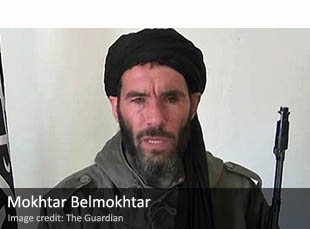French, US intelligence intensify 23-year hunt for Algerian militant
February 11, 2013 1 Comment
 By JOSEPH FITSANAKIS | intelNews.org |
By JOSEPH FITSANAKIS | intelNews.org |
Although many Westerners are aware of the ongoing upsurge in al-Qaeda-linked activity in northwest Africa, few are able to point to the individual leaders behind it. To an important extent, Islamist-inspired groups in the region, notably Al-Qaeda in the Islamic Maghreb (AQIM) mirror the decentralized insurgency model developed by Islamist groups in Iraq and elsewhere during the past decade. However, the decentralized nature of the insurgency in northwest Africa does not necessarily entail the complete absence of principal figures in the movement. One case in point is that of Mokhtar Belmokhtar, who leads an AQIM-linked brigade known as al-Muaqioon Biddam (Those Who Sign With Blood). Born in 1972, Belmokhtar is an Algerian nomad who has reportedly been tracked by the United States Central Intelligence Agency for over 20 years. In the late 1980s, Belmokhtar traveled to Pakistan and then to Afghanistan, where he was taught the art of insurgency at al-Qaeda-funded training camps. Following the Soviet withdrawal, he left Afghanistan and returned to his homeland, where he joined the Armed Islamic Group of Algeria (GIA) and fought in the brutal 10-year civil war that ripped the country apart. In 2003, two years after the end of the war, Belmokhtar and his militia were pushed into northern Mali by the Algerian military. He soon set up camps in the area and used them to stage abduction raids into southern Algeria, targeting foreign oil workers and tourists. The Wall Street Journal reports that, according to the US department of State, in less than a decade, Belmokhtar’s militia managed to raise approximately $50 million through kidnapping foreigners and extorting cocaine smugglers traveling through Mali on their way to Europe. His big break came in 2011, when the collapse of the Libyan regime resulted in the unprecedented availability of illicit weapons previously in the hands of Muammar al-Gaddafi’s army. Belmokhtar’s militia became one of the principal buyers of Libyan weapons available in huge quantities in the black market. In January of this year, armed to the teeth with newly acquired Libyan weapons, Belmokhtar and his men stormed the Tigantourine gas facility near In Amenas in southern Algeria, where they took over 800 workers hostage. The hostage-takers killed 37 workers, including several Americans, before escaping south. The Wall Street Journal reports that Washington has now mobilized the CIA, the Federal Bureau of Investigation, the Drug Enforcement Administration, as well as the Joint Special Operations Command, in an attempt to find and kill or capture Belmokhtar. For the same purpose, the US Department of Defense is also considering building a new drone base in Niger, says the paper. But knowledgeable observers argue that detecting Belmokhtar’s whereabouts will be close to impossible without a significant military and intelligence presence on the ground. It is believed that the Algerian nomad has led his men to the Adrar des Ifoghas, described by The Journal as “a mountainous gash of petrified lava slogs and cave-pocked stone outcrops he size of the United Kingdom”. A 4,000-strong French military force has recently taken control of Kidal, a small trading town on the outskirts of the Ifoghas, which Paris plans to use as a base from which to hunt down Belmokhtar. But Cedric Leighton, a retired French Air Force Colonel with experience in working with the French military in Africa, tells the paper that, before they hope to score victories against Belmokhtar’s men, Western troops will first have to learn how to “distinguish between militants and nomads in the Sahara. This”, he says, “could take years”.







Looks like regime change in Libya by the US and the rest of NATO has reaped all sorts of dubious benefits. Granted the Arab Spring was the right time to justify the invasion of Libya.
Not only has Libya been destabilized for a decade (?) but surrounding countries are worse off as well due to the weapons flows mentioned in the article. AQ was already in the region, but with the Libyan invasion and increasing Western presence generally, that branch of AQ appears now to be drawing huge numbers of extra recruits.
In invading Libya did the US and rest of NATO underestimate the insurgency-terrorism disaster (aka blowback”) that they appear to have created?
Or was it intentional?